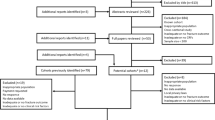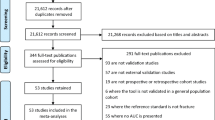Abstract
Multivariate prediction algorithms such as FRAX® and QFractureScores provide an opportunity for new prognostic biomarkers to be developed and incorporated, potentially leading to better fracture prediction. As more research is conducted into these novel biomarkers, a number of factors need to be considered for their successful development for inclusion in these algorithms. In this review, we describe two well-known multivariate prediction algorithms for osteoporosis fracture risk applicable to the UK population, FRAX and QFractureScores, and comment on the current prognostic tools available for fracture risk; dual X-ray assessment, quantitative ultrasonography, and genomic/biochemical markers. We also highlight the factors that need to be considered in the development of new biomarkers. These factors include the requirement for prospective data, collected in new cohort studies or using archived samples; the need for adequate stability data to be provided; and the need for appropriate storage methods to be used when retrospective data are required. Area under the receiver operating characteristic curve measures have been found to have limited utility in assessing the impact of the addition of new risk factors on the predictive performance of multivariate algorithms. New performance evaluation measures, such as net reclassification index and integrated discrimination improvement, are increasingly important in the evaluation of the impact of the addition of new markers to multivariate algorithms, and these are also discussed.



Similar content being viewed by others
References
Kanis JA, Johnell O, Oden A, Johansson H, McCloskey E (2008) FRAX and the assessment of fracture probability in men and women from the UK. Osteoporos Int 19:385–397
Bouxsein ML (2003) Bone quality: Where do we go from here? Osteoporos Int 14(suppl 5):S118–S127
McCloskey EV, Johansson H, Oden A, Kanis JA (2009) From relative risk to absolute fracture risk calculation: the FRAX algorithm. Curr Osteoporos Rep 7:77–83
Cook NR (2007) Use and misuse of the receiver operating characteristic curve in risk prediction. Circulation 115:928–935
Burge R, Dawson-Hughes B, Solomon DH, Wong JB, King A, Tosteson A (2007) Incidence and economic burden of osteoporosis-related fractures in the United States, 2005–2025. J Bone Miner Res 22:465–475
Abrahamsen B, van Staa T, Ariely R, Olson M, Cooper C (2009) Excess mortality following hip fracture: a systematic epidemiological review. Osteoporos Int 20:1633–1650
Kanis J (2007) Assessment of osteoporosis at the primary health care level. World Health Organization, Lyon
Kanis JA, Oden A, Johansson H, Borgström F, Ström O, McCloskey E (2009) FRAX® and its applications to clinical practice. Bone 44:734–743
Kanis JA, Johnell O (2005) Requirements for DXA for the management of osteoporosis in Europe. Osteoporos Int 16:229–238
Black DM, Steinbuch M, Palermo L, Dargent-Molina P, Lindsay R, Hoseyni MS, Johnell O (2001) An assessment tool for predicting fracture risk in postmenopausal women. Osteoporos Int 12:519–528
Johansson H, Kanis JA, Oden A, Johnell O, McCloskey E (2009) BMD, clinical risk factors and their combination for hip fracture prevention. Osteoporos Int 20:1675–1682
Johnell O, Kanis JA, Oden A, Johansson H, De Laet C, Delmas P, Eisman JA, Fujiwara S, Kroger H, Mellstrom D, Meunier PJ, Melton LJ 3rd, O’Neill T, Pols H, Reeve J, Silman A, Tenenhouse A (2005) Predictive value of BMD for hip and other fractures. J Bone Miner Res 20:1185–1194
Garton MJ, Cooper C, Reid D (1997) Perimenopausal bone density screening—Will it help prevent osteoporosis? Maturitas 26:35–43
Barr RJ, Stewart A, Torgerson DJ, Reid DM (2010) Population screening for osteoporosis risk: a randomised control trial of medication use and fracture risk. Osteoporos Int 21:561–568
Hippisley-Cox J, Coupland C (2009) Predicting risk of osteoporotic fracture in men and women in England and Wales: prospective derivation and validation of QFractureScores. BMJ 339:1291–1295
Collins GS, Mallett S, Altman DG (2011) Predicting risk of osteoporotic and hip fracture in the United Kingdom: prospective independent and external validation of QFractureScores. BMJ (in press)
Hippisley-Cox J, Coupland C (2012) Derivation and validation of updated QFracture algorithm to predict risk of osteoporotic fracture in primary care in the United Kingdom: prospective open cohort study. BMJ (in press)
Kanis JA, Oden A, Johansson H, McCloskey E (2012) Pitfalls in the external validation of FRAX. Osteoporos Int 23:423–431
Cummins NM, Poku EK, Towler MR, O’Driscoll OM, Ralston SH (2011) Clinical risk factors for osteoporosis in Ireland and the UK: a comparison of FRAX and QFractureScores. Calcif Tissue Int 89:172–177
Kanis JA, Oden A, Johnell O, Johansson H, De Laet C, Brown J, Burckhardt P, Cooper C, Christiansen C, Cummings S, Eisman JA, Fujiwara S, Gluer C, Goltzman D, Hans D, Krieg MA, La Croix A, McCloskey E, Mellstrom D, Melton LJ 3rd, Pols H, Reeve J, Sanders K, Schott AM, Silman A, Torgerson D, van Staa T, Watts NB, Yoshimura N (2007) The use of clinical risk factors enhances the performance of BMD in the prediction of hip and osteoporotic fractures in men and women. Osteoporos Int 18:1033–1046
Schousboe JT (2008) Cost effectiveness of screen-and-treat strategies for low bone mineral density: How do we screen, who do we screen and who do we treat? Appl Health Econ Health Policy 6:1–18
Stewart A, Kumar V, Reid DM (2006) Long-term fracture prediction by DXA and QUS: a 10-year prospective study. J Bone Miner Res 21:413–418
Hans D, Krieg MA (2009) Quantitative ultrasound for the detection and management of osteoporosis. Salud Publica Mex 51(suppl 1):S25–S37
Bauer DC, Gluer CC, Cauley JA, Vogt TM, Ensrud KE, Genant HK, Black DM (1997) Broadband ultrasound attenuation predicts fractures strongly and independently of densitometry in older women: a prospective study. Arch Intern Med 157:629–634
Langton CM, Langton DK (2000) Comparison of bone mineral density and quantitative ultrasound of the calcaneus: site-matched correlation and discrimination of axial BMD status. Br J Radiol 73:31–35
Zhu K, Devine A, Prince RL (2009) Quantitative ultrasound measurements predict fracture in older women: a 10-year longitudinal study. Bone 44:S118
Moayyeri A, Kaptoge S, Dalzell N, Bingham S, Luben RN, Wareham NJ, Reeve J, Khaw KT (2009) Is QUS or DXA better for predicting the 10-year absolute risk of fracture? J Bone Miner Res 24:1319–1325
Garnero P, Hausherr E, Chapuy M-, Marcelli C, Grandjean H, Muller C, Cormier C, Bréart G, Meunier PJ, Delmas PD (1996) Markers of bone resorption predict hip fracture in elderly women: the EPIDOS prospective study. J Bone Miner Res 11:1531–1538
Vasikaran S, Eastell R, Bruyère O, Foldes AJ, Garnero P, Griesmacher A, McClung M, Morris HA, Silverman S, Trenti T, Wahl DA, Cooper C, Kanis JA (2011) Markers of bone turnover for the prediction of fracture risk and monitoring of osteoporosis treatment: a need for international reference standards. Osteoporos Int 22:391–420
Garnero P, Sornay-Rendu E, Chapuy MC, Delmas PD (1996) Increased bone turnover in late postmenopausal women is a major determinant of osteoporosis. J Bone Miner Res 11:337–349
Ralston SH (2005) Genetic determinants of osteoporosis. Curr Opin Rheumatol 17:475–479
Arden NK, Baker J, Hogg C, Baan K, Spector TD (1996) The heritability of bone mineral density, ultrasound of the calcaneus and hip axis length: a study of postmenopausal twins. J Bone Miner Res 11:530–534
Mann V, Ralston SH (2003) Meta-analysis of COL1A1 Sp1 polymorphism in relation to bone mineral density and osteoporotic fracture. Bone 32:711–717
Navarro MC, Sosa M, Del Pino-Montes J, Torres A, Salido E, Saavedra P, Corral-Gudino L, Montilla CA (2007) Collagen type 1 (COL1A1) Sp1 binding site polymorphisms is associated with osteoporotic fractures but not with bone density in post-menopausal women from the Canary Islands: a preliminary study. Aging Clin Exp Res 19:4–9
Klee EW, Hoppman-Chaney NL, Ferber MJ (2011) Expanding DNA diagnostic panel testing: Is more better? Exp Rev Mol Diagn 11:703–709
Brown MA (2005) Genetic studies of osteoporosis—a rethink required. Calcif Tissue Int 76:319–325
Barr R, Macdonald H, Stewart A, McGuigan F, Rogers A, Eastell R, Felsenberg D, Glüer C, Roux C, Reid DM (2010) Association between vitamin D receptor gene polymorphisms, falls, balance and muscle power: results from two independent studies (APOSS and OPUS). Osteoporos Int 21:457–466
Robbins JA, Schott AM, Garnero P, Delmas PD, Hans D, Meunier PJ (2005) Risk factors for hip fracture in women with high BMD: EPIDOS study. Osteoporos Int 16:149–154
Shepstone L, Fordham R, Lenaghan E, Harvey I, Cooper C, Gittoes N, Heawood A, Peters TJ, O’Neill T, Torgerson D, Holland R, Howe A, Marshall T, Kanis JA, McCloskey E (2012) A pragmatic randomised controlled trial of the effectiveness and cost-effectiveness of screening older women for the prevention of fractures: rationale, design and methods for the SCOOP study. Osteoporos Int (in press)
Elliott P, Peakman TC (2008) The UK Biobank sample handling and storage protocol for the collection, processing and archiving of human blood and urine. Int J Epidemiol 37:234–244
Patel R, Blake GM, Fogelman I (2007) Evaluation of osteoporosis using skin thickness measurements. Calcif Tissue Int 81:442–449
Saito M, Marumo K (2010) Collagen cross-links as a determinant of bone quality: a possible explanation for bone fragility in aging, osteoporosis, and diabetes mellitus. Osteoporos Int 21:195–214
Langholz B, Thomas DC (1990) Nested case-control and case-cohort methods of sampling from a cohort: a critical comparison. Am J Epidemiol 131:169–176
Kenis G, Teunissen C, De Jongh R, Bosmans E, Steinbusch H, Maes M (2002) Stability of interleukin 6, soluble interleukin 6 receptor, interleukin 10 and CC16 in human serum. Cytokine 19:228–235
McClish DK (1989) Analyzing a portion of the ROC curve. Med Decis Making 9:190–195
Cook NR (2008) Statistical evaluation of prognostic versus diagnostic models: beyond the ROC curve. Clin Chem 54:17–23
Rapsomaniki E, White IR, Wood AM, Thompson SG, Emerging Risk Factors Collaboration (2012) A framework for quantifying net benefits of alternative prognostic models. Stat Med 31:114–130
Vickers AJ, Elkin EB (2006) Decision curve analysis: a novel method for evaluating prediction models. Med Decis Making 26:565–574
Pepe MS, Feng Z, Gu JW (2008) Comments on “Evaluating the added predictive ability of a new marker: from area under the ROC curve to reclassification and beyond,” by M. J. Pencina et al. Stat Med. 27:173–181. doi:10.1002/sim.2929
Pencina MJ, D’Agostino RB Sr, D’Agostino RB Jr, Vasan RS (2008) Evaluating the added predictive ability of a new marker: from area under the ROC curve to reclassification and beyond. Stat Med 27:157–172
Schwenkglenks M, Lippuner K (2007) Simulation-based cost-utility analysis of population screening-based alendronate use in Switzerland. Osteoporos Int 18:1481–1491
Pencina MJ, D’Agostino RB, Steyerberg EW (2011) Extensions of net reclassification improvement calculations to measure usefulness of new biomarkers. Stat Med 30:11–21
Donaldson MG, Cawthon PM, Schousboe JT, Ensrud KE, Lui LY, Cauley JA, Hillier TA, Taylor BC, Hochberg MC, Bauer DC, Cummings SR, Study of Osteoporotic Fractures (SOF) (2011) Novel methods to evaluate fracture risk models. J Bone Miner Res 26:1767–1773
Author information
Authors and Affiliations
Corresponding author
Additional information
The authors have stated that they have no conflict of interest.
Rights and permissions
About this article
Cite this article
Poku, E.K., Towler, M.R., Cummins, N.M. et al. Develo** Novel Prognostic Biomarkers for Multivariate Fracture Risk Prediction Algorithms. Calcif Tissue Int 91, 204–214 (2012). https://doi.org/10.1007/s00223-012-9627-0
Received:
Accepted:
Published:
Issue Date:
DOI: https://doi.org/10.1007/s00223-012-9627-0




